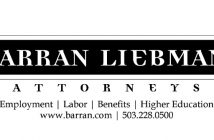Malcolm Ford to his preschool classmates on what his father, actor Harrison Ford, does for a living, “My daddy is a movie actor, and sometimes he plays the good guy, and sometimes he plays the lawyer.”
Even William Shakespeare in Henry VI, Part 2 was unkind to lawyers: “The first thing we do, let’s kill all
the lawyers.”
Lawyers are the brunt of many jokes and one-liners and the blame for too much litigation and costly lawsuits, but in truth the profession is a noble calling and if you find a good attorney, the person’s advice and assistant can be the life blood of your business. An attorney can make a difference in people’s lives and as one lawyer commented: It doesn’t have to be a big thing. It just has to be good thing.
Technology and the recession are dramatically changing the legal landscape and the ways in which we receive our legal advice. Asked what has been his law firm’s greatest challenge over the last few years Jason Conger of Miller Nash LLP in Bend said: Adapting to the economic reality that impacts us and our clients while continuing to provide counsel and deliver value that exceeds our clients’ needs and expectations.
The lawyers at Schwabe Williamson & Wyatt confirmed that the economy has been a pressing challenge, “The economy has forced us as an organization to challenge some of the basic principles (and their underlying assumptions) that have historically guided us as a business and purveyor of legal services. Change in any organization does not come easily, and law firms are certainly no different. Understanding the realities of the volatile marketplace, and adapting to the ever-changing legal and business landscape have presented us, as well as many of our clients, with significant challenges in ways that we (and they) haven’t been tested previously.”
Karnopp Petersen law firm confirms the challenge, “As a regional law firm, our great challenge has been residing in an area that has been so severely impacted by the economic downturn.”
Read inside about some local law firms’ thoughts on the economy and their profession.
Law Firms Weigh in on Economy / Best Practices
Cascade Business News recently asked local attorneys about their law firms and the economy, here are the responses:
MILLER NASH LLP with JASON CONGER RESPONDING
Please give a brief overview of your law firm, how many attorneys, how it is structured, what are your areas of expertise?
Miller Nash LLP is a regional multiservice law firm, offering comprehensive, creative, and innovative services to its clients since 1873. Miller Nash has 116 lawyers serving clients through its offices in Bend, Prineville, Portland, Seattle and Vancouver. We serve a wide range of leading businesses, nonprofit organizations, public entities, and individuals, as well as providing pro bono representation. The firm’s clients operate in a variety of significant industries, including banking, biotech, construction, energy, food production, forest products, government, healthcare, higher education, intellectual property, manufacturing, real estate, securities, and technology. My practice is focused on business formation, governance and complex transactions.
How has your firm changed during the recession?
Well, certain countercyclical practice areas, like litigation and bankruptcy, have gotten busier. And, like nearly every business, we have lowered our growth expectations and have looked for ways to reduce overhead and be more cost efficient. But in general, Miller Nash has remained financially strong and operationally stable.
Have you added or downsized any particular department to meet the changes in the economy?
Not really, except that our hiring of new associates has been concentrated in busy practice areas.
What has been your company’s greatest challenge?
Adapting to the economic reality that impacts us and our clients while continuing to provide counsel and deliver value that exceeds our clients’ needs and expectations.
Please share your thoughts on what Central Oregon could do to make the region more business friendly.
Near term we can emphasize the advantages of our Enterprise Zones in Bend, Redmond and Prineville, our relatively low cost of living and incredible quality of life. Long term, we should work to grow OSU Cascades into a full scale university, streamline local permitting processes, and proudly advertise our competitive advantages, like a highly skilled workforce, affordable power, excellent workers compensation program, etc.
What advice would you give to other business people regarding their legal needs? What things are essential, for instance, that they pay close attention to?
Obviously the answer depends on the business or industry, but certainly making sure your human resource department is using best practices, paying close attention to your rights, obligations and risks in contracts that are material to your business, and adopting good controls and governance processes are important to any business.
How do you handle pro bono work, do you focus on one particular area of law? What other ways does your firm contribute to the local community?
Because we are a large firm, we have a wide variety of pro bono clients. Given my corporate law background, I generally represent nonprofit corporations on a pro bono basis and provide much of the same counsel I would to my other business clients. We make significant contributions to community groups (like the Chamber of Commerce and Central Oregon Builders Association) as well as many charitable organizations, both as a firm and as individuals. And I am honored to represent Bend in the Oregon Legislature.
SCHWABE, WILLIAMSON & WYATT
Please give a brief overview of your law firm, how many attorneys, how it is structured, what are your areas of expertise?
Like Central Oregon itself, the Bend office of Schwabe, Williamson & Wyatt offers the best of both worlds. Just as Bend has both small town charm and big city amenities, Schwabe offers small firm service with big firm experience and resources. Schwabe has eight attorneys in Bend, serving clients in a wide range of litigation and business transaction services, including business formation and governance, employment and labor advice, real estate, land use, and condemnation, commercial litigation, environmental, water rights and natural resources, and tax and estate planning. Schwabe was founded over 100 years ago in Portland, where we are headquartered, and also maintains offices in Salem and Eugene, Oregon, as well as in Seattle and Vancouver, Washington.
How has your firm changed during the recession?
The recession has certainly forced us to bring greater discipline to the business of our law firm. Overall, the legal industry throughout the country experienced a significant reduction in demand for services, and some areas – both geographic and legal specialties – were hit harder than others; Schwabe experienced some of that, both in Bend and generally throughout the firm. And while some practices were particularly hard-hit (real estate, land use, some business transactions), others have actually grown (employment advice and litigation, and litigation generally).
The circumstances required our firm leadership to closely monitor business indicators and to adapt accordingly by adjusting our thinking going forward. Schwabe’s diversity of practices enabled us to weather the storm quite well. Keeping an eye on our business, adjusting and adapting (but not overreacting) has helped Schwabe succeed during these challenging times; we believe that such practice will serve us well as the economy emerges from the recession and bodes well for our firm’s future.
Have you added or downsized any particular department to meet the changes in the economy?
Some practice areas which suffered a sustained decrease in demand for a specialized legal service did require some right-sizing, both in Bend and in the firm generally. By the same token, a variety of factors – some a result of the economy – have created growth opportunities that we have aggressively pursued. As we approach growth opportunities, we try to be agile, opportunistic, strategic and (especially amidst a challenging economy realistic.
What has been your company’s greatest challenge?
The economy has forced us as an organization to challenge some of the basic principles (and their underlying assumptions) that have historically guided us as a business and purveyor of legal services. Change in any organization does not come easily, and law firms are certainly no different. Understanding the realities of the volatile marketplace, and adapting to the ever-changing legal and business landscape have presented us, as well as many of our clients, with significant challenges in ways that we (and they) haven’t been
tested previously.
Please share your thoughts on what Central Oregon could do to make the region more business friendly.
Stay active and encourage the elected leaders, both local and state, to bring reasonable balance to our land use system so that businesses may have predictability and a reasonable time frame to obtain any required permits. The current timeline to accomplish major projects is unacceptable but has come to be the norm. Infrastructure and an educated workforce are essential to sustained growth.
Support Central Oregon’s efforts to grow its OSU Cascades Campus and support COCC working alongside OSU Cascades. Continue to support the efforts of EDCO, which has developed an excellent track record assisting expansion of local business and landing new businesses. Urge our elected leaders to stop the avalanche of ever-changing regulations; to entice investors, we must have predictable, known rules.
What advice would you give to other business people regarding their legal needs? What things are essential, for instance, that they pay close attention to?
Interview your lawyer and find out what experience he or she has in the area where you need help and what resources he or she can bring to bear to solve your legal issue. Identify the goals you want the lawyer to achieve for you. Stay involved in the process and don’t be afraid to ask for estimated costs and the amount of time your key management team may have to devote to resolving the matter, and push for an early resolution. Have the lawyer provide legal advice with you making the business decisions along the way.
How do you handle pro bono work, do you focus on one particular area of law? What other ways does your firm contribute to the local community?
Schwabe actively encourages our attorneys to provide pro bono legal advice, and many of them have at least one pro bono matter in their current mix of work, helping such clients get their homes back, address automobile obligations and collections issues, and solve problems relating to individual civil rights. Our lawyers and the firm also contribute significant financial aid to the Campaign For Equal Justice, which provides substantial support to legal aid offices throughout Oregon, including the one located in Bend. In addition, the firm was a founder and has been a major sponsor and source of volunteers of the East County Legal Clinic in Portland, serving the most underserved in that community. Firm wide, Schwabe attorneys have provided over 3,900 hours of pro bono legal work in 2011.
Schwabe lawyers are proud of their community participation and their service in volunteer leadership positions in a broad spectrum of nonprofit, community, and industry organizations in Bend and Central Oregon, including The High Desert Museum, Central Oregon Community College, EDCO, Bend Chamber of Commerce, Rotary Club, Central Oregon Builders Association, Oregon Employer Council Central Oregon, Opportunity Knocks, Network of Entrepreneurial Women, Deschutes Children’s Foundation, Abiltree (formerly known as CORIL), Boys and Girls Club, Volunteers in Medicine, Healing Reins Therapeutic Riding Center, Big Brothers Big Sisters of Central Oregon, First Story, Crystal Springs Youth Ranch, and J Bar J Youth Services, among others.
KARNOPP PETERSEN LLP
Please give a brief overview of your law firm, how many attorneys, how it is structured, what are your areas of expertise?
Based in Bend, Karnopp Petersen is the preeminent Central Oregon law firm. For over 75 years, our lawyers have been serving the legal needs of businesses and individuals regionally and throughout Oregon. Local roots and strong community ties have created a firm devoted to our clients and their causes. Our firm currently has 18 attorneys, 14 are partners.
Our attorneys provide legal expertise in a variety of areas, including business law, employment law, civil litigation, creditors’ rights, real estate, land use and estate planning.
How has your firm changed during the recession?
The recession has been an opportunity for Karnopp Petersen to create and hone efficiencies. We have done our best to adapt to the current climate to meet the needs of our clients who have been impacted by the economic downturn.
Have you added or downsized any particular department to meet the changes in the economy?
Karnopp Petersen is currently working to expand both our business and litigation departments. We recently posted two Associate level positions and are hoping to fill those as soon as possible.
What has been your company’s greatest challenge?
As a regional law firm, our great challenge has been residing in an area that has been so severely impacted by the economic downturn.
Please share your thoughts on what Central Oregon could do to make the region more business friendly.
High taxes and infrastructure costs make it difficult for companies to relocate to Central Oregon. Creating enterprise zones, reducing system development charges and decreasing taxes would make this region more business friendly.
What advice would you give to other business people regarding their legal needs? What things are essential, for instance, that they pay close attention to?
Involve your attorney early so they can be proactive in helping you plan for now and the future. It’s more cost effective and saves time.
How do you handle pro bono work, do you focus on one particular area of law? What other ways does your firm contribute to the local community?
As a firm, Karnopp Petersen encourages attorneys in all practice areas to participate in Pro Bono work as the Bar defines it. We recently won the Oregon State Bar New Lawyers Division Award for the Highest Level of Pro‐Bono Service in the Medium Sized Firm Category. We were the only non‐Portland firm to be recognized for our Pro Bono efforts.
This last year, Karnopp Petersen hosted the inaugural Business 20/20 Executive Breakfast. Business 20/20 will bring high caliber business experts to Central Oregon to promote new ideas, promote professional growth and provide sophisticated educational opportunities to Central Oregon. Business 20/20 will challenge public and private community leaders to address difficult issues that are critical to business development in Central Oregon.
Karnopp Petersen has been invested in the Central Oregon community since 1935. We have created the Business 20/20 Executive Breakfast Series to foster the health and growth of our business community and an enduring economy that supports jobs, schools and community as a whole for future generations.




